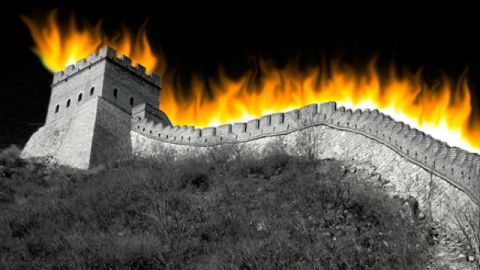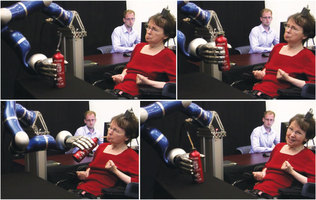Will Chen Guangcheng Ever Return to China?

The blind 40-year-old Chinese dissident who escaped from house arrest in April — improbably evading guards, finding his way to the U.S. embassy in Beijing and, after a diplomatic fracas, acquiring a visa to study law in the United States — landed at Newark Liberty airport on Saturday. Less than a month after fleeing his village in Shandong Province, Chen Guangcheng and his family are free in Greenwich Village. The question is whether they are here for good.
The diplomatic turmoil of the Chen saga is now over. No warrant remains for Mitt Romney’s “dark day for freedom” charge against the administration. Hillary Clinton can breathe easy, having brought the dissident to safety. China gets a gadfly off its hide and outside its Great Firewall: as the foreign ministry told Reuters, “Chen Guangcheng is a Chinese citizen. China’s relevant departments have handled the procedures for exiting the country in accordance with the law.” So China is pitching Chen’s departure as simply the case of a citizen who received a visa “through normal channels,” not that of an activist seeking American protection after his advocacy on behalf of women forced to have abortions and sterilizations brought him seven years of imprisonment and house arrest.
How does Chen benefit from this arrangement? Life in the United States is just beginning for him, his wife and their two children. He will study law on a fellowship at NYU, but he faces the challenge of learning English before he can make sense of tort law or civil procedure. Chen has said he plans to keep up the fight for human rights in his native country, but his voice will be muted there and relatives who remain in China may be subject to harassment, violence or imprisonment by the authorities.
The clearest advantage to Chen is the safety and freedom he and his immediate family now enjoy, a respite from years of surveillance and fear. Here are Chen’s words when he touched down on Saturday, drawn from an ABC News report:
“For the past seven years, I have never had a day’s rest,” he said through a translator, “so I have come here for a bit of recuperation for body and in spirit.”
“I feel like everybody is very passionate,” he said. “I will say a few simple words to everyone here. After much turbulance. I have come out … thanks to the assistance of many friends. The embassy has given me partial citizenship here. I’m very grateful to the U.S. and to the Chinese government for my protection over the long term. Very grateful to other friends like France, who have called in their support. I am gratified the Chinese government dealt with situation with restraint and calm.”
The curious idea here is the “partial citizenship” Chen thinks he is receiving in the United States. There is no such category in U.S. immigration law. Either you’re a citizen or you aren’t. Chen’s official status in the United States is, apparently, a “nonimmigrant visitor.” Chinese authorities agreed to Chen’s flight to the U.S. as a visiting student, not as a persecuted man seeking asylum abroad. Even if Chen had requested and received asylum in the United States, he would have arrived not as a “partial citizen” but as a refugee and would have had to wait one year to apply for a green card to work in the United States. Permanent residency status could perhaps be spun as a form of “partial citizenship,” but as a visitor Chen is not eligible to apply for it. And another detail: Chen is still a Chinese citizen, and China is not among the countries with which the U.S. permits dual citizenship.
What will Chen do when he completes his fellowship at NYU? In a telephone interview reported by Bloomberg News, Chen said that he intends to return to China: “I don’t know when I’ll come back, but I’ll definitely come back.” This sentiment was echoed by Wang Dan, an activist in the 1989 Tiananmen Square protests who accepted asylum in the United States in 1998. Here is his closing advice to Chen in a New York Times op-ed earlier this month:
I also hope [Chen] knows that even if he leaves, all of us who are exiles will one day return to China.
The expression of a dream of return is common to most Chinese exiles but a reality for few. Earlier this month, another Tiananmen Square protest leader, Wu’er Kaixi, was unable to enter China to visit his ailing parents. Tianmenen leader Chai Ling has been barred as well:
She leads a corporate life in the West, seemingly away from the fight for human rights and democracy in China.
Another Tiananmen student leader, Li Lu, has carved out a successful new career as an investment banker in the U.S. The Columbia University alumnus has even been tipped to succeed tycoon Warren Buffett at Berkshire Hathaway.
But such exit strategies are not an option for people such as Liu Xiaobo. The 2010 Nobel Peace laureate chose to return to China from the U.S. during the Tiananmen protests and was thrown behind bars several times.
Even after his most recent arrest in 2009, Liu made it clear that exile was not an alternative to prison. In December that year, he was sentenced to 11 years in jail for “inciting subversion of state power.”
The dilemma Chen faced during the first week of May was wrenching enough. Now that he has reached the United States, it is unclear whether he’ll be allowed to return home on terms that he could accept.
Image credit: Ryan Mc Laughlin
Follow Steven Mazie on Twitter: @stevenmazie





